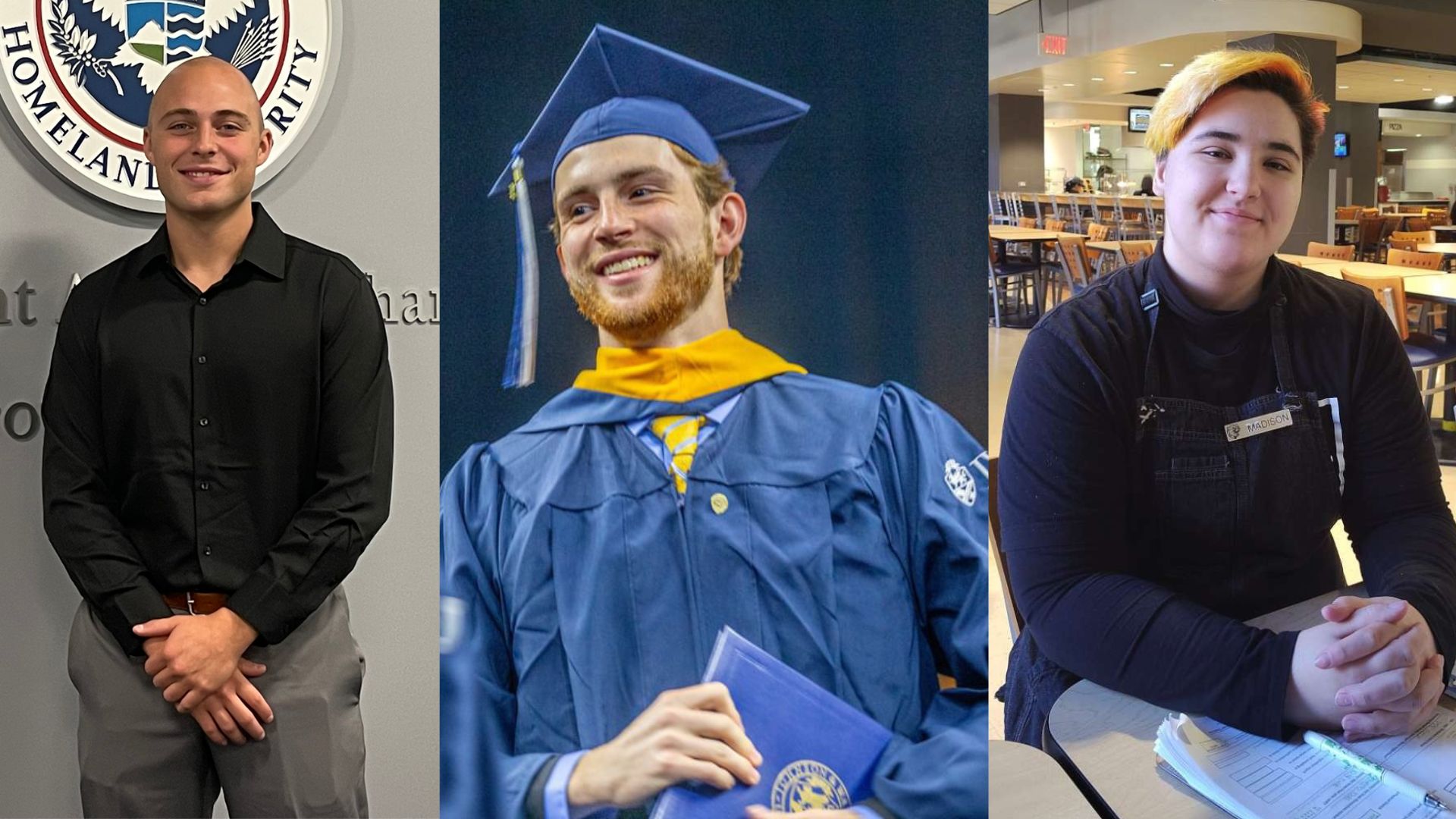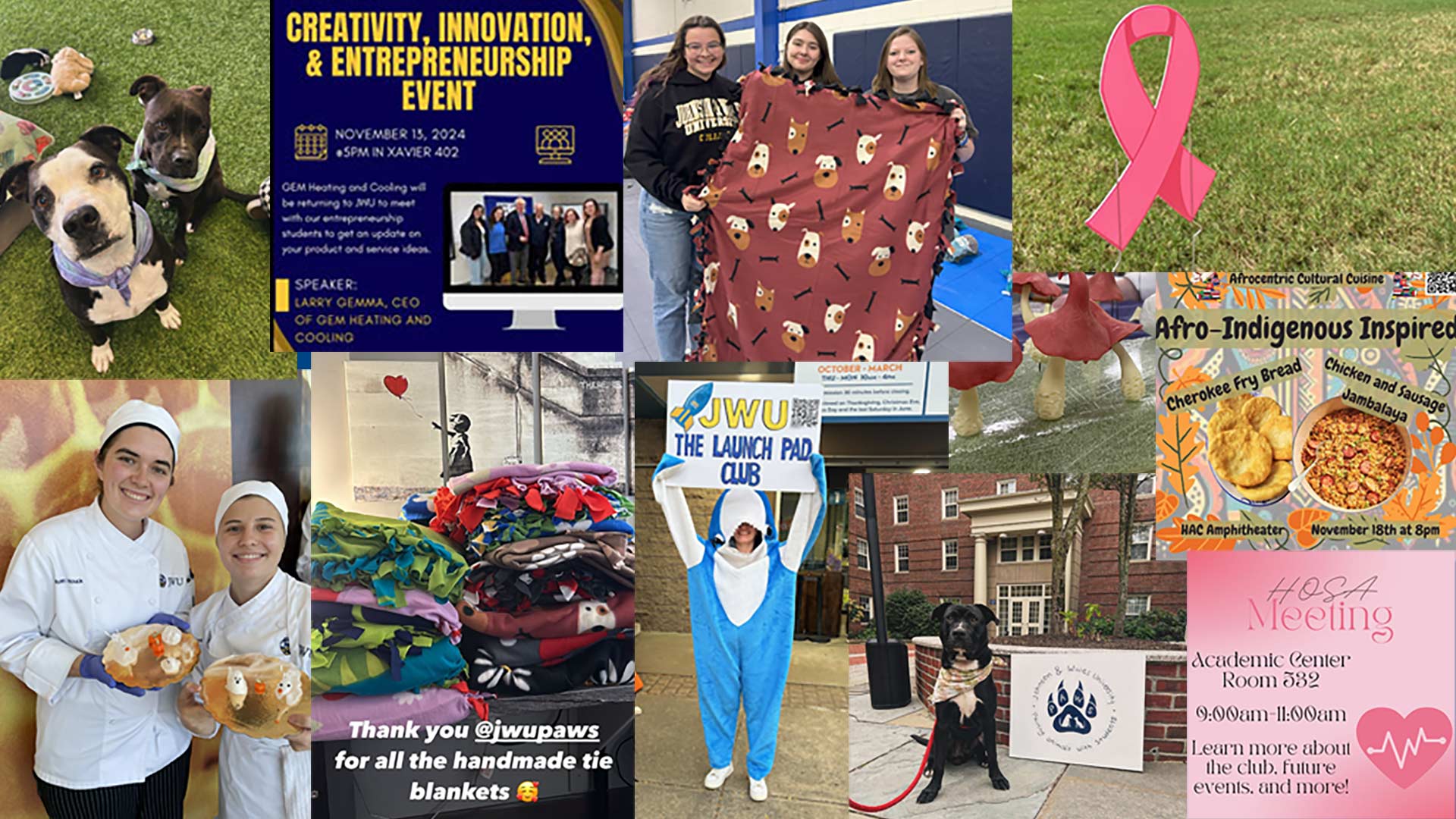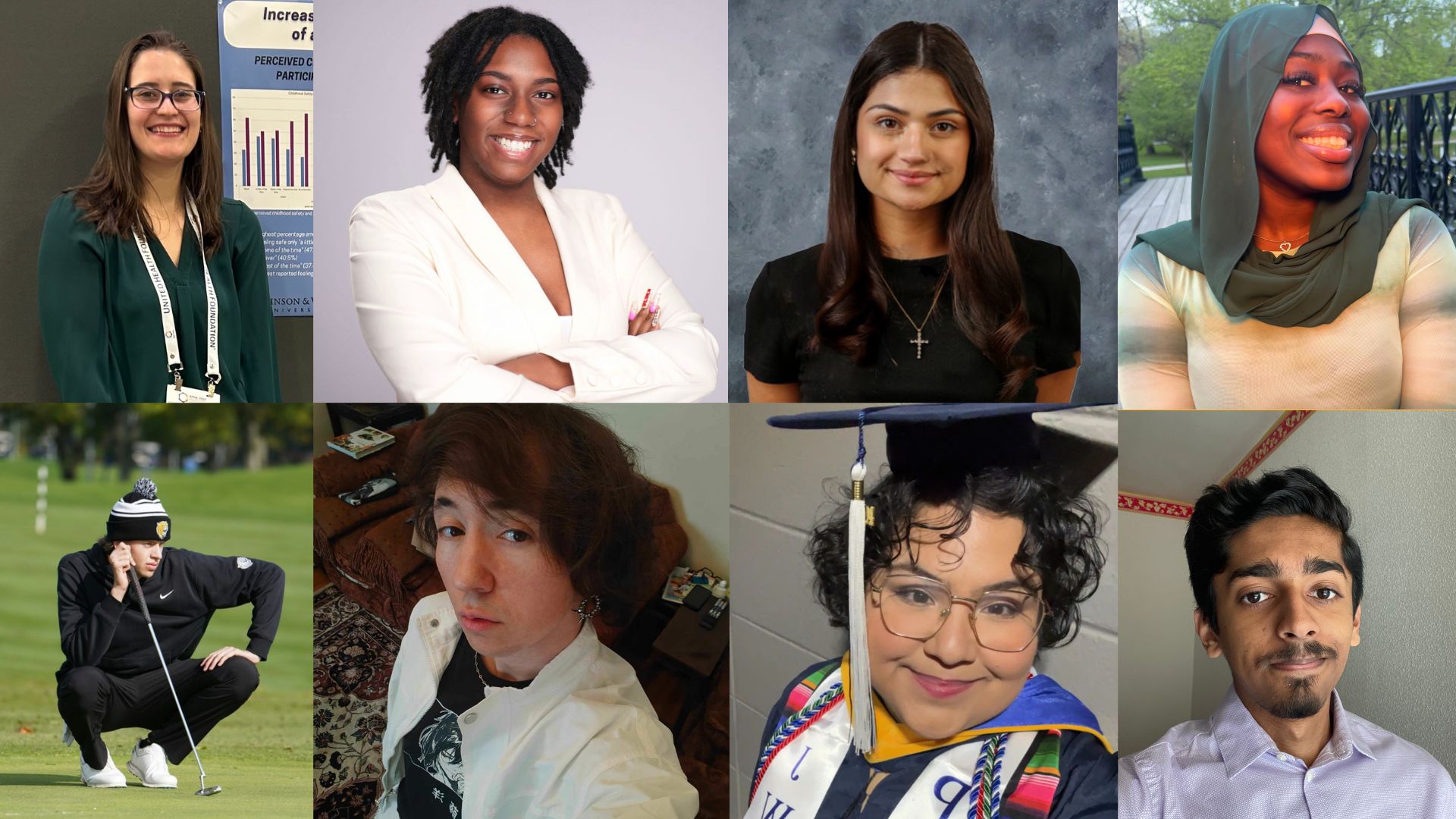5 Student Clubs Making an Impact
Friendship, culture, networking, competition — so many things make student-run clubs and organizations essential at Johnson & Wales University. And if the topic or sport Wildcats seek doesn’t exist, they can start their own club or org chapter (which some of the below did!).
Check out just a few clubs that have recently made an impact on campus.
JWU P.A.W.S. (Pairing Animals with Students)
“The JWU P.A.W.S. Club brings animal lovers across JWU together to support local animal shelters,” explains P.A.W.S. President Ashlynn Kirraine ’25. “From monthly volunteer days at the shelter to on-campus events creating items to donate (toys, blankets, dog biscuits), we connect students to animals.”
Within its first semester last year, P.A.W.S. volunteered three times, made 30 blankets and 80 toys, and baked 463 dog biscuits in collaboration with the JWU Club of Culinary Excellence. “This year we intend to significantly increase those numbers and create even stronger connections with Rhode Island's no-kill animal shelters,” notes Ashlynn.
Ashlynn’s original idea was for students to foster pets while living at JWU, since JWU’s campuses are already equipped with pet-friendly housing. Instead, campus administrators suggested starting a club and seeing if students were interested.
“The immediate response was overwhelming; people were excited to be a part of it and to jump in with both feet,” Ashlynn recalls. “There was clearly an interest.”
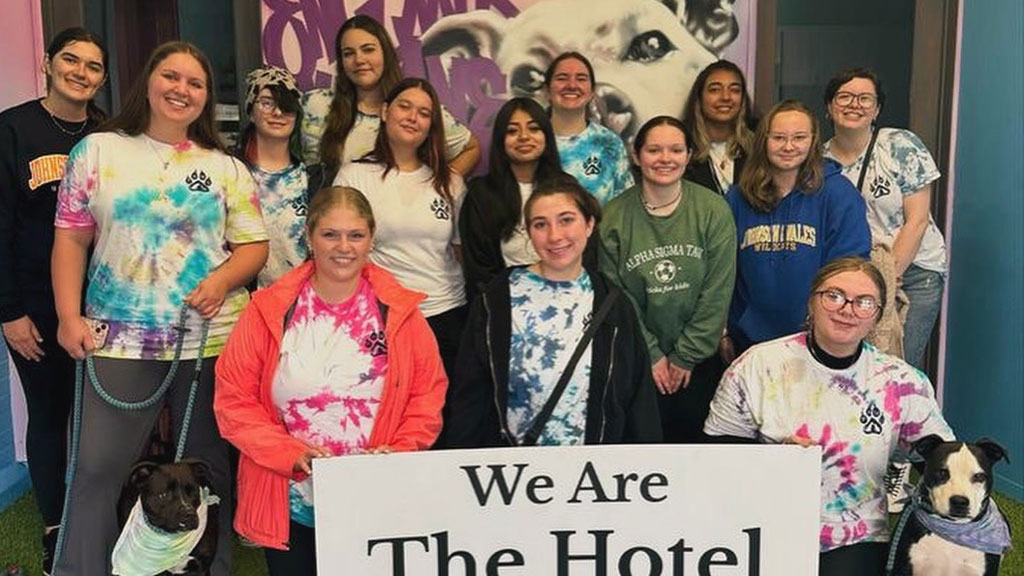
JWU P.A.W.S. Vice President Ava Melinn ’25, a Marketing & Advertising major, knew Ashlynn from working at JWU, and she was excited when Ashlynn pitched the idea. “I was already volunteering at Hotel for Homeless Dogs in Cumberland,” Ava notes. “I’d been working with them since they started the organization, so it was a perfect connection.”
How P.A.W.S. Operates
When Ashlynn and Ava started P.A.W.S. at the end of Fall 2023, they initially did collaborative events with other JWU organizations such as sororities and fraternities who often seek community service opportunities.
“We went on trips, taking the JWU bus to shelters and dividing duties so that some students walked dogs on walking trails, others played with dogs, and others bathed those new to the shelter,” Ashlynn recalls. “On campus, we’ll gather and make items to donate – handmade blankets, rope toys out of old t-shirts, things like that. It’s been a great bonding experience for people, but it also benefits local shelters, so it’s a win-win.”
This year, P.A.W.S. traveled to Potter League for Animals in Middletown to participate in puppy yoga. This spring, they’re hoping to visit a cat café and an animal sanctuary. “We’d love to expand so we’re incorporating other animals besides dogs and cats,” Ashlynn explains.
Proudest P.A.W.S. Moment (So Far)
“Just being able to see so many students come up to us at Involvement Fest saying they’d heard of P.A.W.S. and wanted to join was amazing,” Ava shares. “We were fundraising t-shirts for club to pay for buses and other activities — white ones with the JWU P.A.W.S. logo, with a matching bandana for dogs, that students will be able to tie-dye at an upcoming event — and we needed 30 to submit the order. We actually sold 79! The interest was very rewarding.”
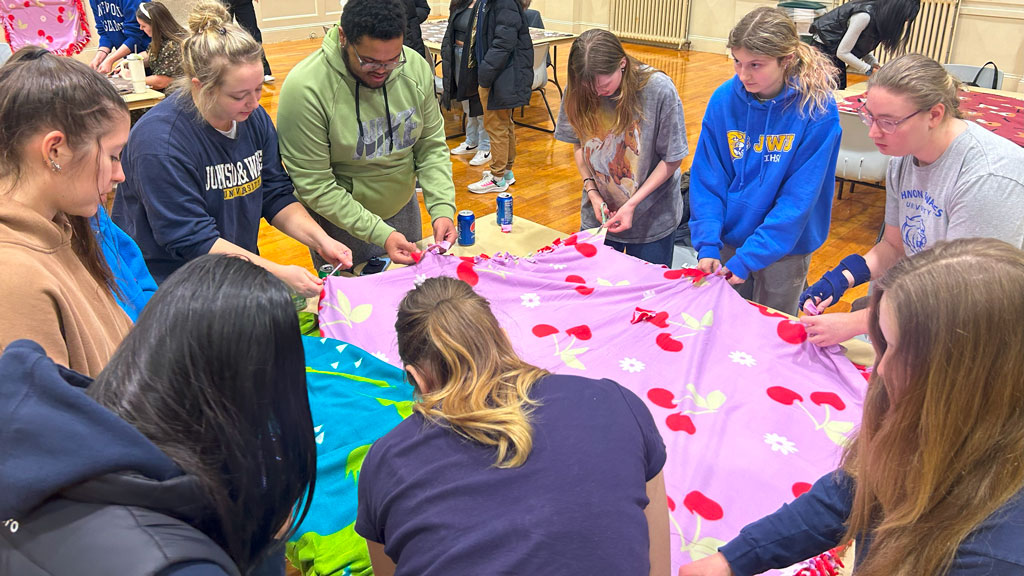
“Last year P.A.W.S. won the New Organization of the Year award, and that was huge,” shares Ashlynn. “It’s so nice to see the energy of so many people coming together for a good cause, such as making blankets for animals. On our first shelter trip, the bus ride on the way there was silent because most people were strangers. On the way back everyone was talking, laughing, sharing what they’d done with the dogs; it was so great to see this start of friendships for people.”
Envisioning P.A.W.S.’s Future
Three of the four executive board members for P.A.W.S. are JWU seniors, so legacy has been on their mind.
“As interest continues to grow — we already have 200 members — I see the club growing,” Ashlynn explains of the demand. “For a recent shelter trip, the signup sheet filled in just 32 seconds! So many people want to be part of P.A.W.S., and we’re trying to work with other shelters and grow that way.”
“I want to expand and help as many animals as we can and donate as many supplies as we can,” Ava shares. “I go to shelters, ask what they need and get as many people interested as possible. Giving people a safe space to make friends and hang out with animals was a big thing for me, and I want to continue that. Handing the club off to people I trust is important to keep doing good for the community.”
How to Connect with P.A.W.S.
Follow JWU P.A.W.S. on Instagram for signup sheets and announcements. “We don’t hold physical meetings, but our executive board plans trips and encourages people to sign up and join when they can,” Ashlynn explains. “It’s a low commitment, high reward situation.”
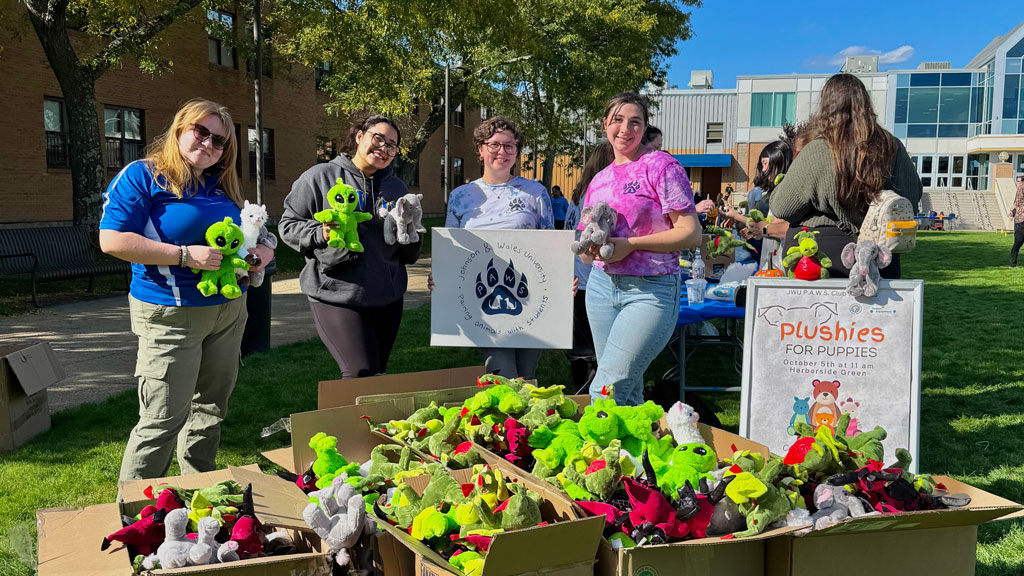
“I’ve been in clubs in the past with exact meeting times that might conflict with a class or a lab, so I love that P.A.W.S. events are sometimes on the weekend and sometimes during the week,” adds Ava. “You can prioritize other things and still be part of our club.” Check out Ashlynn’s recent interview on the This Week at JWU Podcast sharing ways to get involved with animals on campus — and to hear more about puppy yoga!
Health Occupation Students of America (HOSA) JWU Charlotte
Health programs have been growing at Johnson & Wales University, and Health Science major Trinity Knauf ’25 knew there could be room for a health occupation club at JWU.
“I was inspired to create this club because JWU Charlotte had room to grow in promoting other aspects of health and wellness beyond Active Minds, whom we work with quite often,” Trinity shares. “I think it is very important to make students aware of local health issues as well as ones that can affect the college student population. I also wanted to help and learn more about the healthcare world, as well as volunteer my time to the community. This buildup of goals led me to creating HOSA.”
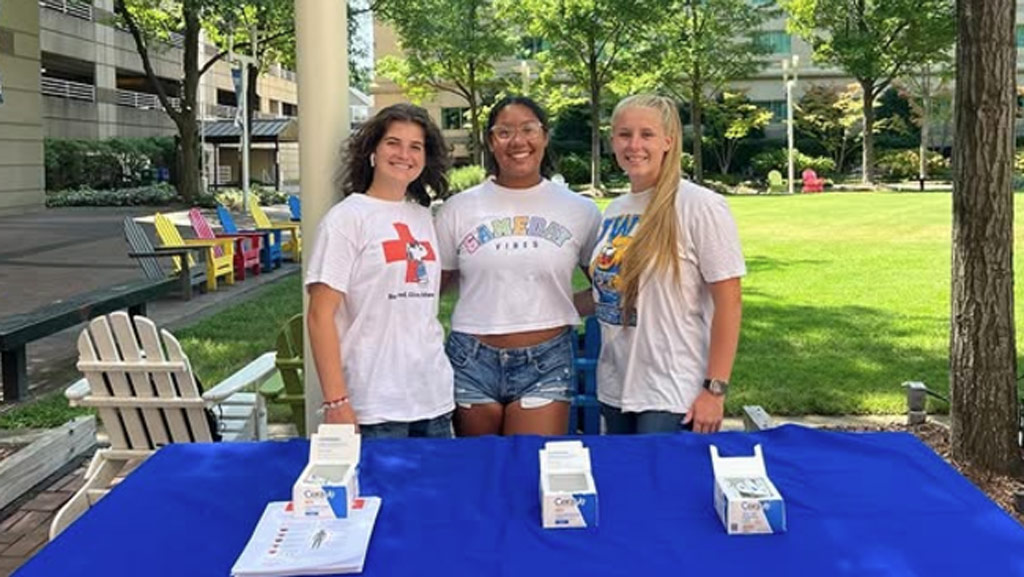
HOSA’s vice president, Health Science major Alivia Hahn ’27, was no stranger to HOSA before the club launched on campus. “I was a part of the club in high school and want to continue with it at JWU,” she explains. (HOSA – Future Health Professionals is among the many Career Technical Student Organizations [CTSO] with which JWU partners.)
How HOSA Operates
“We try to plan events based on local health issues or national awareness months so we can make students aware of what’s happening in health around the world and create awareness for prevention measures for certain things,” explains Trinity. “For example, we did a Summer Sun Safety event and presented a ‘how to spot skin cancer’ information paper for students.” HOSA works closely with JWU's College of Health & Wellness faculty Audrey Roberts, Michael Childers, Chris Roy and Lisa Foster. “They have helped me over the years in school and they always jump at the chance to help this club, as they think it is very important for our campus,” Trinity notes.
“We have meeting once a month,” Alivia shares. “During special event such as Wales and Tails we typically have at least two members of the club there to represent HOSA. We are mainly College of Health & Wellness students, so our members include Health Science, Psychology and Nutrition majors.”
Right now, HOSA is focusing on fundraising to be able to spread even more awareness of health issues. “We held a chocolate fundraiser in order to raise money for our club so we can hold events on campus this semester,” Trinity reports. “We also worked with Charlotte SHOUT! to raise money.”
HOSA will be planning another fundraiser in the spring semester as well.
Proudest HOSA Moment (So Far)
Trinity has been proud of HOSA’s recruitment process. “I have LOVED the recruitment events as I have been able to bring people to our club who are not even in a health-related major, because they truly have an interest in the health world but no way to learn more about it,” she shares. “I love being able to answer questions and make people aware of health-related events and issues that may affect them; it is super gratifying.”
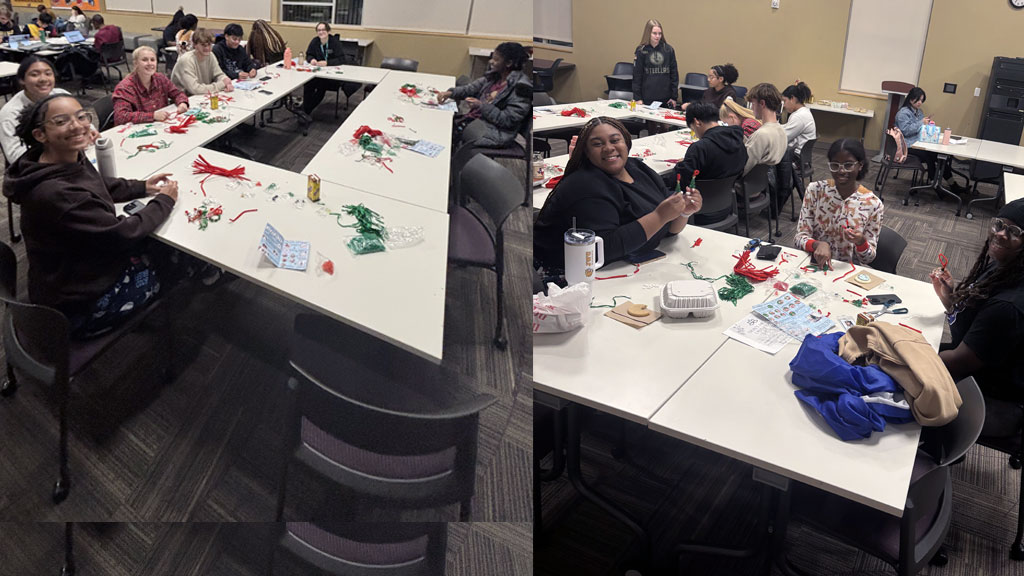
“So far my proudest moment was when we hosted a Breaking the Silence event in the Wildcat Den,” Alivia says. “It was heartwarming to see everyone come together and be willing to be valuable.”
One more reason for HOSA to be proud: "We opened our last event of the semester to the entire JWU community," reports Trinity. "It was great to see so many people spreading joy by making ornaments for a low-income nursing home!"
Envisioning HOSA’s Future
“I envision HOSA at JWU Charlotte being a huge part of serving our local community in health-related events through volunteering and maybe even creating connections for internships for health students,” says Trinity. “I also envision HOSA going to national competitions on behalf of JWU.”
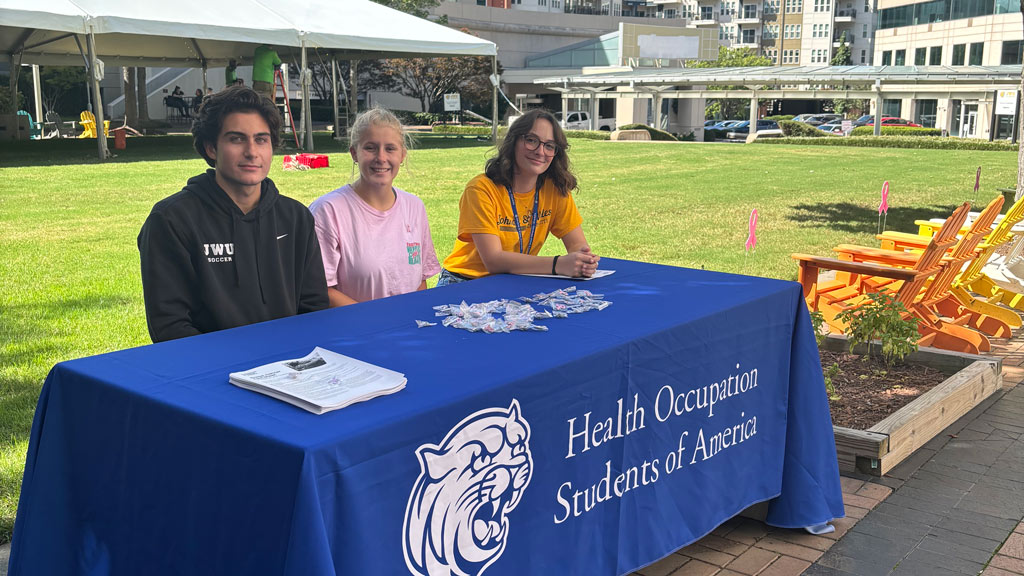
As the national chapter of HOSA is built upon providing competition opportunities for students at the regional and national level, Alivia also hopes JWU’s club can reach that level. “I want to be able to compete with other schools,” she says, adding, “And I want to leave a legacy that is fun and inclusive.”
How to Connect with HOSA
To learn more about health issues, follow HOSA on Instagram for events, meetings and announcements. Or pop into HOSA’s regular meetings, which are held in JWU’s Academic Center the second Friday of every month at 9am.
Afrocentric Culinary Cuisines (ACC) Club
Joraya Brown ’27, who is majoring in Culinary Nutrition and minoring in Beverage Service Management, saw a need in her first year at JWU for more focus on Afrocentric culinary cuisine.
“I got involved in Cooking Asia Club, Club of Culinary Excellence and Culinaria Latina Club at JWU, but I didn’t really see a lot of clubs that really talked about Afrocentrism,” she shares. “Having an African-American background, I didn’t grow up with people who looked like me in the food industry, like on culinary channels or cooking shows. There didn’t seem to be a lot of chefs, bakers, mixologists, etc. who had a lot of knowledge of African roots. I thought it would be cool to have an Afrocentric club and pitched the idea to some friends and in labs/classes. I was surprised so many agreed with what I had to say, so I applied.”
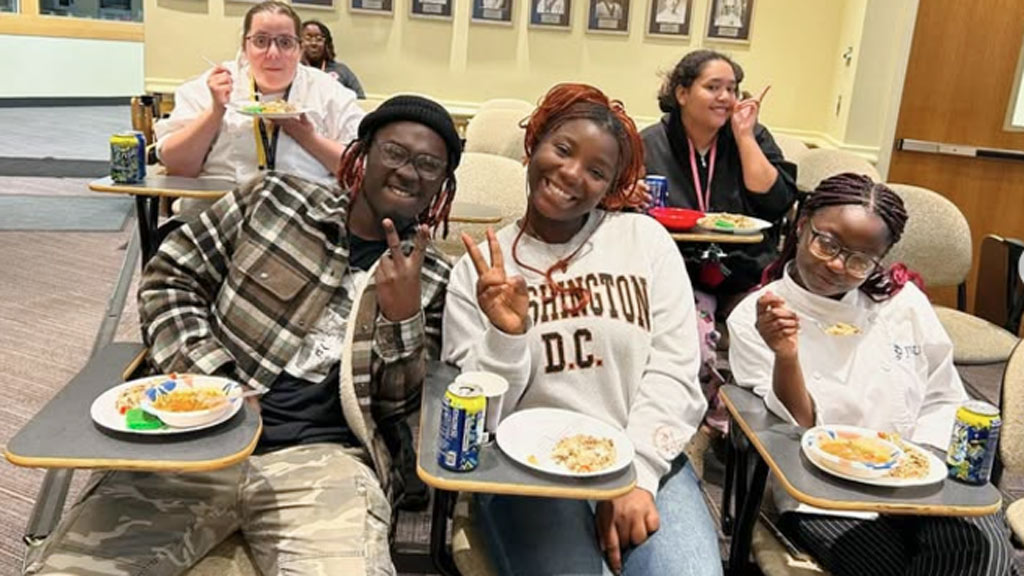
The process took some time, but Joraya was undaunted. “I kept pushing the idea and after a while it actually happened,” she reports. “Chef Lendway has been helpful.”
As a new club without funds, Joraya and Culinary Arts major Gabby Apollon ’28, ACC’s vice president, garnered interest among other students. “We figured out activities and icebreakers to get people to meetings and get them excited to learn about other regions,” Joraya reports.
How ACC Club Operates
“Our goal is to bring different diversity inside of the club through events — especially dishes that represent different cuisines, including Hispanic, Black, Haitian and Jamaican cultures,” explains Gabby. “We produce dishes based on them to tie in that main Afrocentric culture cuisine.”
For instance, for a Day of the Dead event, the club pared a dish of flan, a dessert that has been influenced by Latin America, Spanish and Mexican cultures. For JWU’s Harvest Hoedown, in a representation of Haitian culture, the ACC made Pikliz, which contains pickled cabbage, carrots and peppers. “We’re based on different cultures, bringing a variety of cuisines, and it has been exciting to have people approach us at events,” says Gabby. “There are luxury dishes in other cultures to enjoy, and students and chefs get to explore and have different tastebuds when they taste our foods.”
Adds Joraya, “We did a bake sale where we talked about African honey butter cornbread and peach cobbler cookies. At a West African cuisine night at Snowden [Dining Hall], we displayed different entrées from different African countries. It’s been a great way to introduce diversity at JWU and pinpoint cuisine from different areas in the world people don’t always talk about.”
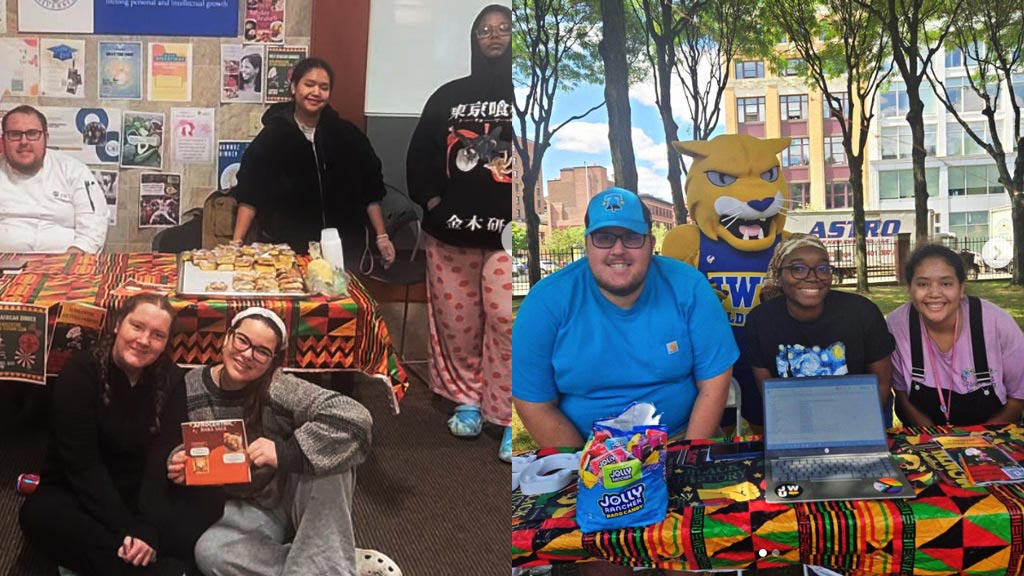
And yes, now that the club has raised some funds, the meetings do tend to include food. “Growing up, I would make peach cobbler all the time as a dessert for social gatherings and celebrations,” says Joraya. “I never had it in cookie format and thought it would be interesting to craft it, learning what works/doesn’t work. Once people enjoyed them so much at the bake sale, I started making them for club meetings, and they’re really popular.”
“We’re finding the dynamic — what everyone enjoys cooking, levels of work ethic, schedule difficulties, all that,” reports Gabby. “Pushing through and being able to successfully pull together events is all that matters. There will be hiccups in the road when not able to produce a dish we wanted to, but we find alternatives. Things go on behind the scenes, but having the end result turn out great is all that matters.”
Proudest ACC Moment (So Far)
“As someone with a Haitian culture background, our cuisines have a very particular taste, so for some the food can be too spicy, acidic, harsh on the tongue or salty,” Gabby explains. “When we served Haitian Pikliz at Harvest Hoedown, I was surprised how many students and faculty not only enjoyed it but came back and bought more for themselves and friends and partners. I really appreciate that when we contributed and made sure things were correctly made, people enjoyed what we all created. I loved seeing people’s faces when able to eat our Haitian foods!”
Joraya is proud of the fledging ACC club for getting to contribute to Taste of JWU, an annual festival where JWU alumni show off their food and wine. “For appetizers, we made tiny samples of chicken and waffles with a twist of maple honey butter sauce,” she reports. “The waffle batter had a biscuit-like, flaky consistency, and it paired well with fried chicken. I was surprised how many people enjoyed it; they kept coming back for more!” She is already experimenting with recipes in hopes of participating in next year’s Taste of JWU event.
Envisioning ACC Club’s Future
“I’d love to be able to see our club grow, have more events to participate in and have all the chefs participate in one of our events,” says Gabby. “This year our meetings were smaller, but as time went on and as we advertised and put up posters, it flourished. People enjoyed our meetings, had fun and tried new dishes. I’d love to get more participants and be able to make tons of food and for all of it to be gone at the end of our meetings. We aim to inform everyone of Afrocentric cultures.” “I want to see ACC introduce different aspects in the food industry,” says Joraya. “JWU is known for our tremendous culinary program and our innovative chefs, but it’s always been a main interest of mine to introduce other aspects, like baking/pastry, mixology, sustainability, agriculture, etc. I think that could attract more majors and bring more awareness of Afrocentric baking, drinks, etc. It’s a learning moment for people that could be fun and enjoyable for everyone.”
How to Connect with Afrocentric Culinary Cuisines Club
ACC Club’s Instagram advertises events and photos, while the club meets in the HAC amphitheater every other Monday at 8pm. “We always have an agenda, Joraya explains. “We set a region or country to talk about.”
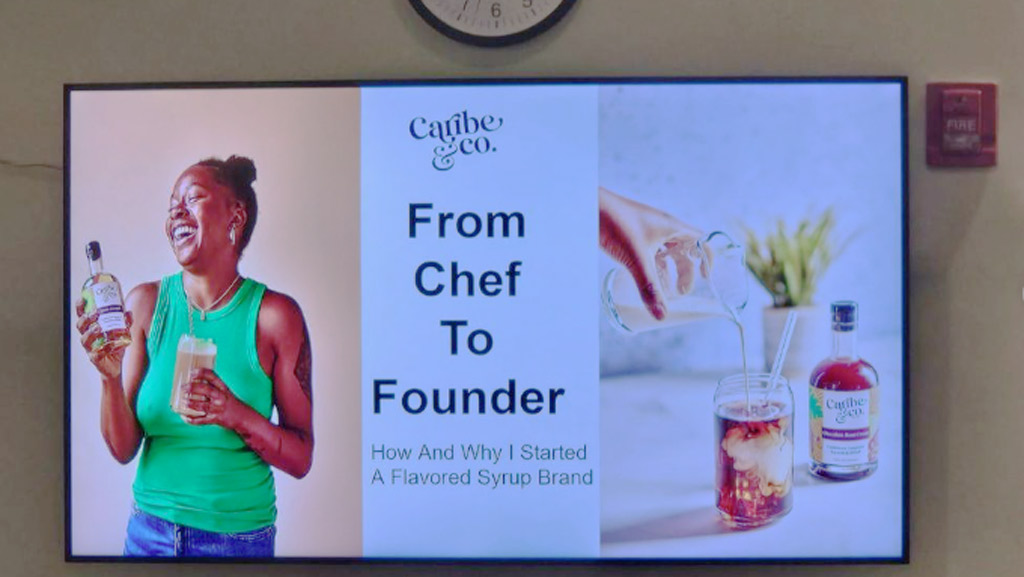
The regions vary in order to showcase all areas of Afrocentric cuisine; for instance, a recent meeting focusing on AfroLatin and Caribbean roots in Panama included beef empanadas. The club invites guest speakers from the community to present on food and beverages outside campus — for instance, a recent meeting featured a guest visit by a JWU alum Savannah Campbell ’19 who created her own mixology brand, Caribe & Co.
The Launch Pad Club
Most JWU Providence students know The Launch Pad, otherwise known as the Larry Freidman Center for Entrepreneurship — a supportive place for students to share dreams and pitch ideas. But The Launch Pad Club’s co-president, Entrepreneurship major Randy Benitez ‘27, saw a greater need for enterprising Wildcats.
“I wanted to provide more representation of the entrepreneurship spirit, as well as a safe space for students to come together and work on their businesses and startups,” he explains.
“The Launch Pad Club specializes in connecting students with other departments to collaborate on each student's startup to make it a dream come true,” Randy continues. “We also host pitch competitions to compete with other students and schools to raise awareness for the business and the potential to earn funding. Lastly, we partner with successful business owners to provide guidance and insight for our students and new business owners. We do all this under the guidance of Dr. Jeffrey Binczyk.”
How The Launch Pad Club Operates
The club’s co-president, Baking & Pastry Arts and Food & Beverage Entrepreneurship major Gabrielle Tringali ’26, shares how the club is trying to build resources for students.
“We respond to emails to create awareness and we get students in,” she explains. “Our mentor, Jeff [Binczyk], is awesome; he’s passionate, he loves to help everyone, and he’s a great sounding board.”
The Launch Pad Club meets idea holders at every stage of their journey: the Explorer stage with idea generation, the Experimenter stage with concept and prototype help and the Venturer stage with business plans. “We work to create networking and sounding boards between students for collaboration — people seeking business partners, people with business ideas or with existing business who are seeking what direction they want to go in,” Gabrielle says. Right now, she’s an adventurer; she’s pretty far into her idea and has weekly or biweekly meetings with Binczyk to further progress her business plan.
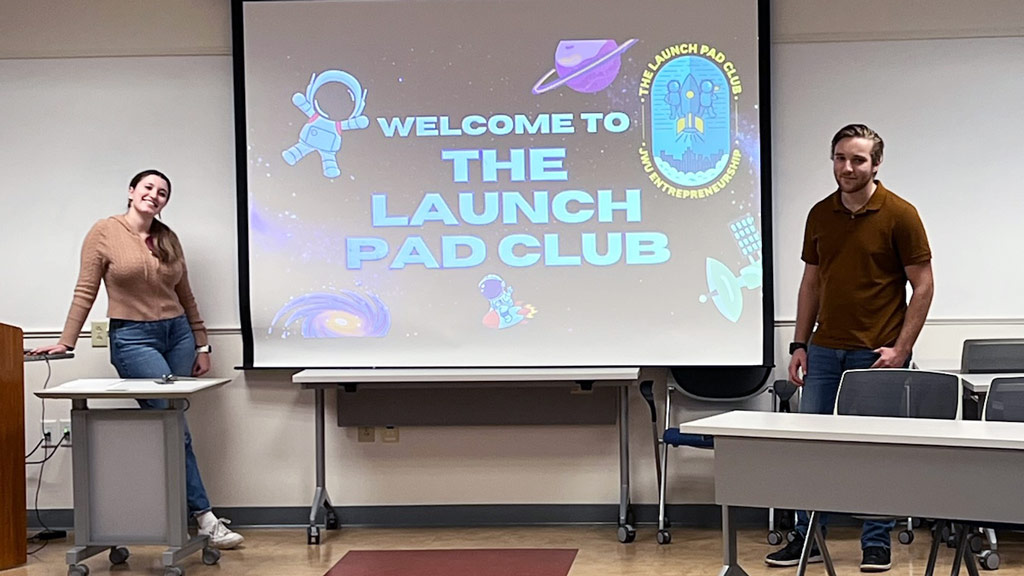
“The Launch Pad Club is for all students across all majors,” she adds. “We even have some graduate and online students, including Randy. He can have deeper conversation with online students virtually while I can connect with students in person.”
Proudest Launch Pad Club Moment (So Far)
“To me, having students present their ideas or existing businesses at our recent event (The Fishbowl) was the proudest moment,” shares Randy. “It means that we are providing the support that our students want and need to get their ideas of the ground.”
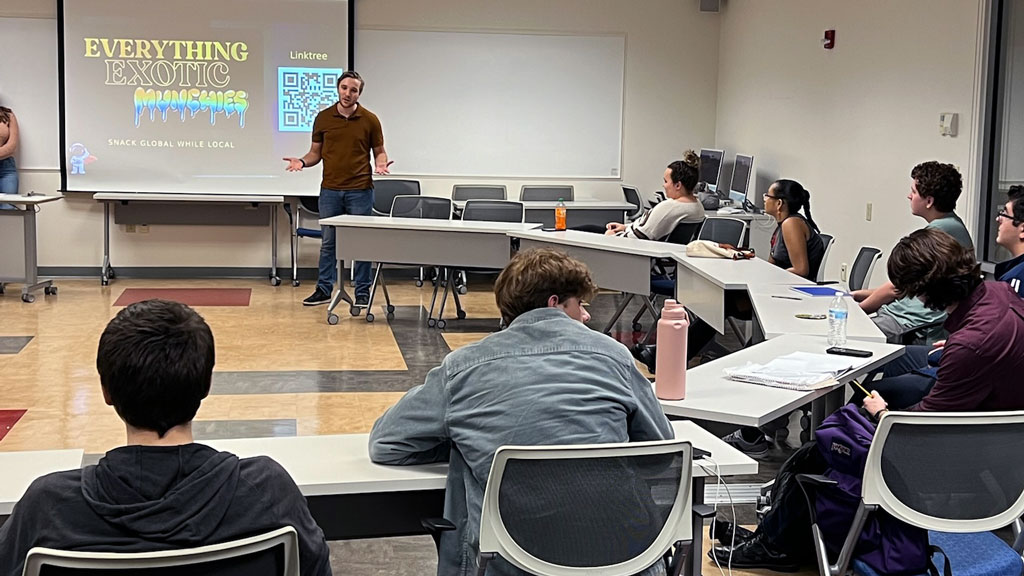
Gabrielle agrees. “We were so happy and proud to get approved as a club because there is so much work in creating awareness,” she says. “The Fishbowl had a great turnout; people had great feedback, and it really gave us an opportunity to talk to them about what they’re looking for and what we can do for them. Lots of what they said was in our minds to plan for, so it’s great to see that we are on the same page.”
Envisioning The Launch Pad Club’s Future
“I envision The Launch Pad Club to become an established entity along with the Larry Friedman Center for Entrepreneurship to recruit new students, such as transfers and high school seniors, to JWU,” Randy says. “I’d love to see it expand beyond Rhode Island and the Northeast.”
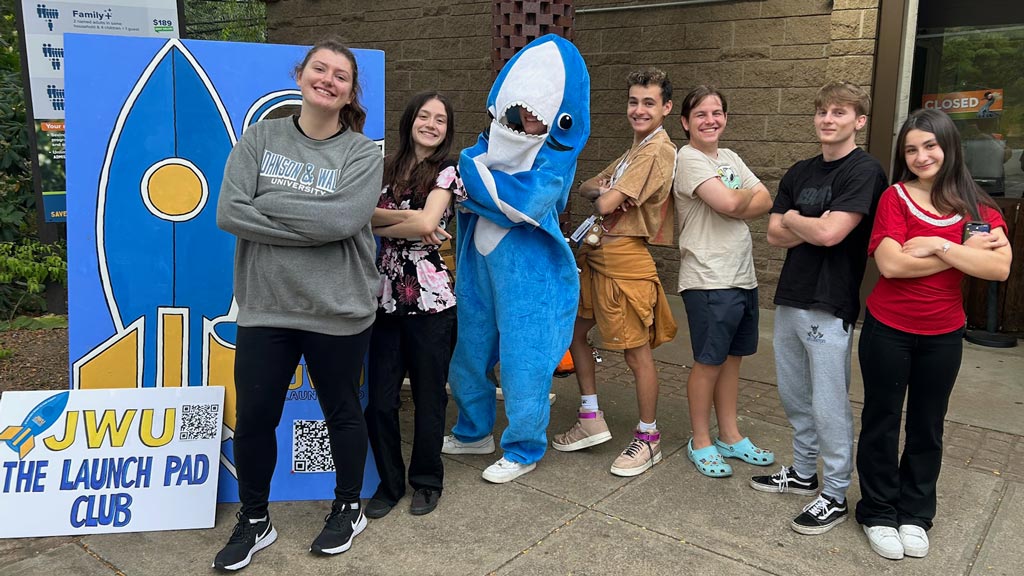
“I would love to continue to expand on what Jeff’s doing showcasing all of the businesses,” says Gabrielle. “I’d love to create a page/website to really showcase all we offer and our success stories and eventually make that attractive to investors. That way, students who are graduating have something to step into if there’s someone looking to help them.”
How to Connect with The Launch Pad Club
Find Launch Pad Club news, signup sheets, event announcements and Instagram, TikTok and Facebook links at The Launch Pad Club’s Linktr.ee or visit the Larry Friedman Center for Entrepreneurship in Room 402 of Xavier.
Pastry Arts Club
Unlike the newer clubs highlighted here, Pastry Arts Club (PAC) has a long history at JWU, dating back at least 20 years. That doesn’t mean the club can’t still have an impact right now.
Club co-president Finch Plingos ’27, a Baking & Pastry Arts major, describes what attracted her: “I love the chefs and the advisors — everyone has tons of experience and connections all around the world and they’re great teachers and mentors. And I love event planning; I did it in high school and it’s great to come to JWU and connect it with baking.”
Co-president Daron Sklar ’27, who majors in Culinary Science & Product Development with a Baking & Pastry focus, explains what drew him to PAC. “Last year I was crazy involved in clubs, but this year it was the most fun because Pastry Arts Club is the most relevant to what I want to do. It’s all due to the community that the club has created and the opportunities to meet great chefs and mentors. I’ve been learning a lot on the backend side, and it’s been interesting planning events for someone who hasn’t done it. It’s such a great opportunity to network, share ideas and learn from each other.”
How Pastry Arts Club Operates
“About twice a month we offer workshops that are free for all majors,” explains Finch. “We pick a theme, give out a recipe packet and let everyone bake for fun on a weekend. We have done workshops on fancy tarts, painting on chocolate canvases, fall loaves and cakes and a Halloween sugar demo with Chef Lagalle. We did a caramel apple fundraiser, a fall cake event and now we’re moving on to cookies.”
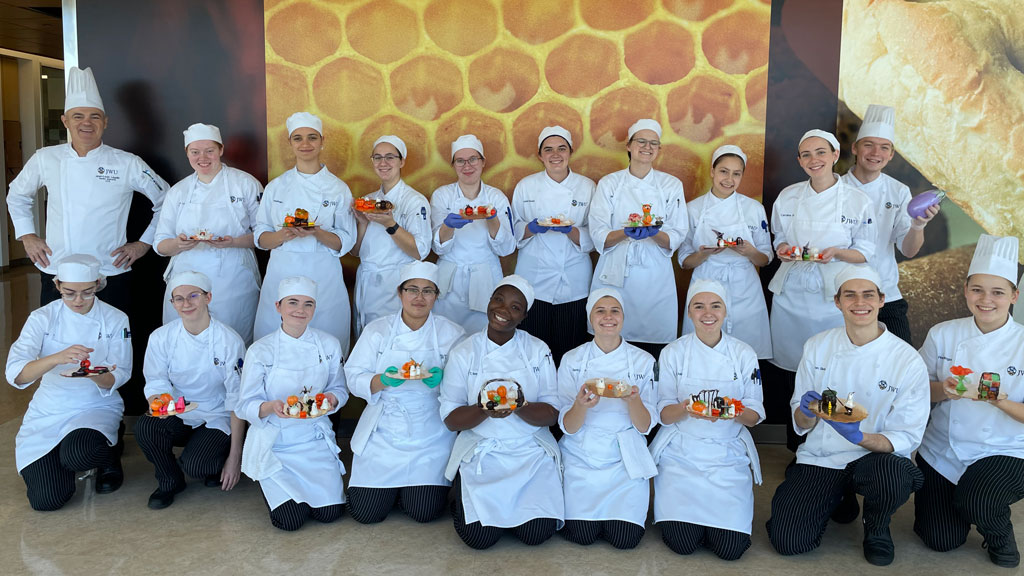
Daron explains some of Pastry Arts Club’s community efforts. “We’re baking cookies — about 300-400 molasses spice and vegan chocolate chip — for the Rhode Island Coalition to End Homelessness, plus we’re designing and baking a five-tier cake for the Sojourner House fundraising gala happening on November 22. We’re entering club competition season between now and winter break, so we’re participating in the Chocolate Clash, making confections and bonbons. And we’re helping Chef Metheny and Chef Lagalle bake for an annual Trans Community Thanksgiving meal, donating desserts to an organization that helps trans kids and adults.”
The club is due-free this year, thanks to support through bake sales. “Any major should be able to learn pastry without financial roadblocks,” says Daron. “On Homecoming & Family Weekend in October, we held our big caramel apple sale. We produced 500 this year, and with the proceeds we can offer free classes for the rest of the year!"
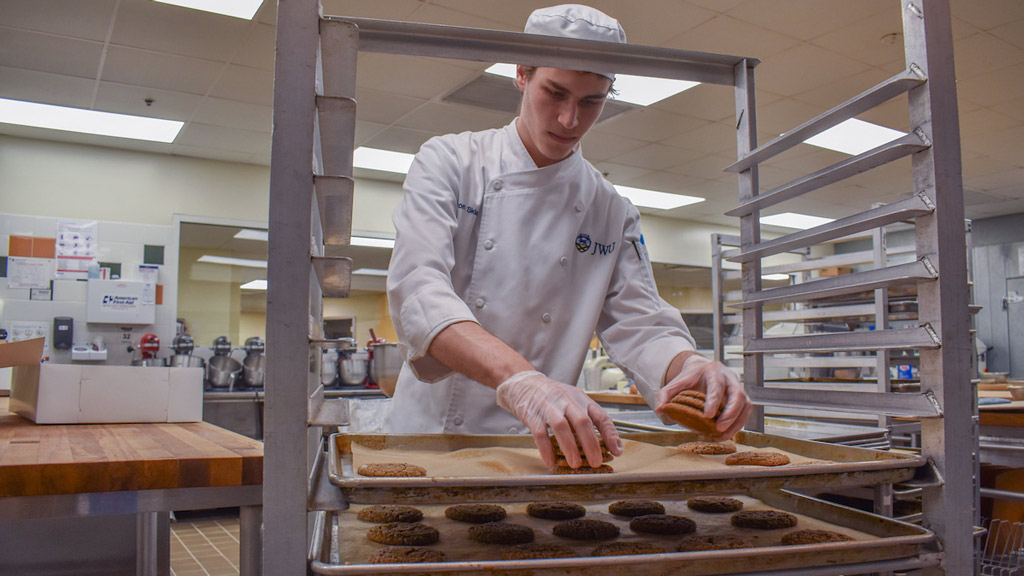
"Ingredients are expensive, so our labs are limited to 20 people," he continued. "If it’s a recipe-based workshop, we come up with 4-5 recipes and scale out based on the amount of people. We’ve made blood orange upside-down olive oil cake, cranberry anadama, sticky pumpkin chestnut toffee gingerbread, hair chestnut cake, poppy almond bundt cake and more. Students can bring the cakes home and share with friends.”
Proudest Pastry Arts Club Moment (So Far)
It’s been so rewarding creating a community,” says Daron. “We have 53% first-year students, then a mix of sophomores and juniors. It’s a strong base of both returning and new students, and it’s exciting to have people come together for the love of baking. I was also proud of the Brunch Social we held in the second floor dining hall. It was our first event of the year, and we had 60 people come.”
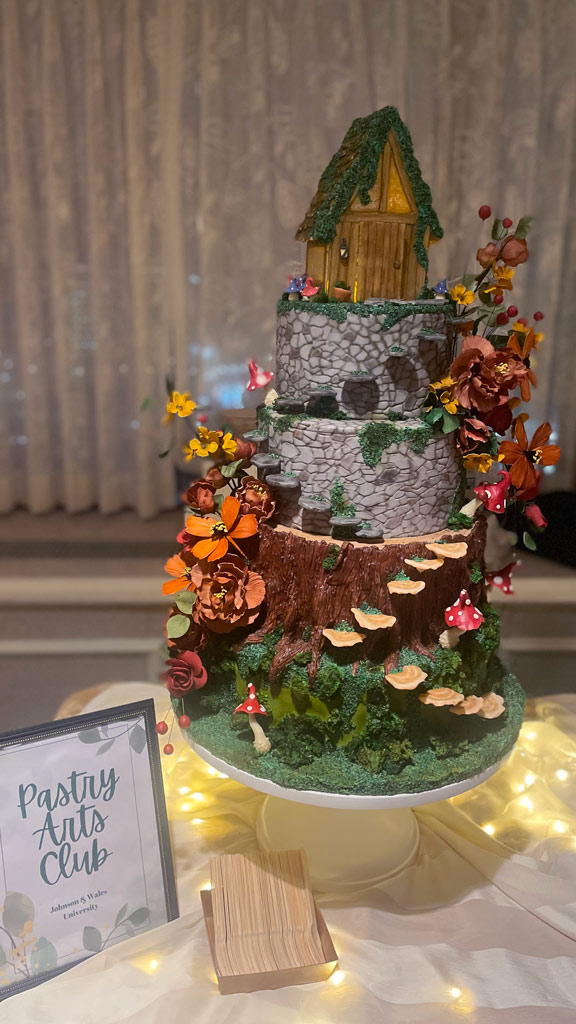
“Hopefully, our proudest moment is yet to come with the cake competition!” exclaims Finch. “I’m also proud of our fancy tarts workshop in September because it was the first one we did. None of us had prior PAC board experience, but we pulled it off, and everything went smoothly and both tasted and looked great. People had fun, and we ran the class ourselves (Chef Lagalle was in the room but was hands-off). Doing the demo and teaching was exciting.”
Envisioning Pastry Arts Club’s Future
“I don’t think we can create a new legacy because Pastry Arts Club is so defined on campus, but we can continue to uphold it,” notes Daron. “It’s known for consistency, so it’s our responsibility to keep that going.”
“Our mission is to give students the opportunity to come in on a weekend and bake without restrictions or grades and learn something new,” says Finch. “We have a set curriculum in classes, but it’s fun to have creative ideas outside of class. With the kitchens right there, why not use them as much as we can? We can learn that it’s OK to make mistakes before we go into the industry.”
Adds Daron: “Our executive board is diverse, ranging from backgrounds in fine dining, chocolatiering, cake design, breads — there are strong viewpoints in different aspects of pastry as knowledge to pass on. The goal is keeping it really strong. We’re one of the largest culinary clubs, and we want to keep up the engagement as much as possible.”
How to Connect with Pastry Arts Club
“We don’t have sit-down meetings; we just get in the kitchen and bake,” notes Finch. “We do a social at the beginning of each semester to gauge interest, then a refresher later in the semester to re-invigorate people,” Daron explains. “We have a theme, and our pastries and beverages follow it. It’s all hands-on in the lab, and we have an email list.” Your best bet to get a seat at that tasty table is to find Pastry Arts Club on Instagram.
